高二英语外研版 选修六 Module6完整学案
- 格式:doc
- 大小:455.00 KB
- 文档页数:10

外研版高中英语选修六模块六第一课时教学设计外研版高中英语选修六模块六第一课时教学设计LG GROUP system office room 【LGA16H-LGYY-LGUA8Q8-LGA162】外研版高中英语选修六模块六第一课时教学设计模块课时划分计划:Period 1:★ Introduction, Listening & Everyday EnglishPeriod 2:★ Vocabulary and ReadingPeriod 3:★ Grammar & FunctionPeriod 4:★ Reading and Writing & Reading and Vocabulary Period 5:★ Reading Practice & Culture Corner第一课时教学设计一、教学内容分析:教学内容:高中《英语》(外研版)选修6 Module 6 War and Peace教学对象:高二学生教学项目:词汇:vengeful, invade, drop, bomb, campaign, chain其他:Introduction; Listening; & Everyday English教学目标:1.语言知识:理解vengeful, invade, drop, bomb, campaign, chain在所学材料中的含义, 掌握其用法。
2.语言技能:在听的过程中能够用关键词记下主要信息;能大致听懂回忆伦敦“闪电战”的采访录音;能够听懂?“谈论记忆”的常见表达。
把读和听的活动结合在一起,综合培养学生的接受能力、英语思维能力?和联想能力。
3.语言运用:说出与“战争与和平”有关的词汇、短语(越多越好),口头简介第二次世界大战,陈述自己对于战争的看法和观点。
4.文化意识:了解第二次世界大战和伦敦“闪电战”的情况。
5.情感态度:维护人类正义,珍爱世界和平。
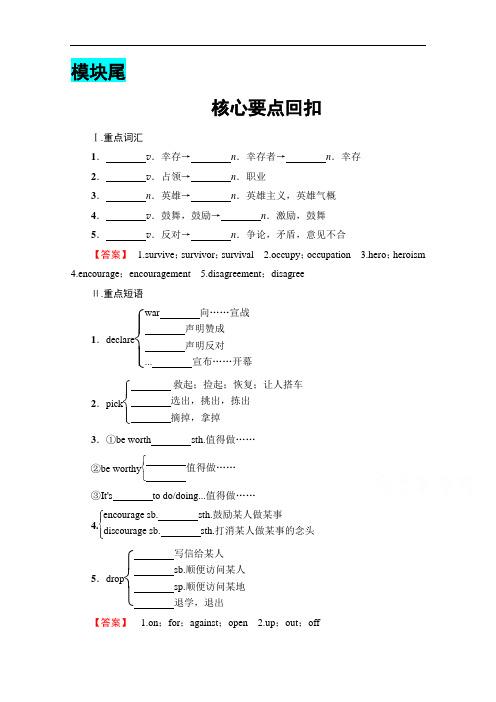
模块尾核心要点回扣Ⅰ.重点词汇1. v .幸存→ n .幸存者→ n .幸存2. v .占领→ n .职业3. n .英雄→ n .英雄主义,英雄气概4. v .鼓舞,鼓励→ n .激励,鼓舞5. v .反对→ n .争论,矛盾,意见不合【答案】 1.survive ;survivor ;survival 2.occupy ;occupation3.hero ;heroism4.encourage ;encouragement5.disagreement ;disagreeⅡ.重点短语1.declare ⎩⎪⎨⎪⎧war 向……宣战声明赞成声明反对... 宣布……开幕2.pick ⎩⎪⎨⎪⎧ 救起;捡起;恢复;让人搭车选出,挑出,拣出摘掉,拿掉3.①be worth sth.值得做……②be worthy ⎩⎨⎧值得做……③It's to do/doing...值得做……4.⎩⎪⎨⎪⎧encourage sb. sth.鼓励某人做某事discourage sb. sth.打消某人做某事的念头5.drop ⎩⎨⎧ 写信给某人sb.顺便访问某人sp.顺便访问某地 退学,退出【答案】 1.on ;for ;against ;open 2.up ;out ;off3.①doing②to be done;of being done③worthwhile 4.to do;from doing 5.a line;in/on;in/at;outⅢ.重点句式1.The operation was extremely dangerous and many soldiers were killed (还没来得及下船).2.The survivors lay on the beach,(疲惫不堪,心有余悸).3.After an hour and forty-five minutes,six of the survivors tried to climb up the cliff to get off the beach.Four were (由于筋疲力尽未能攀上崖端).4.James Ryan is (被卷入第二次世界大战漩涡的第四个兄弟).【答案】 1.before they even got off the boats2.exhausted and shocked 3.too exhausted to reach the top 4.the fourth brother to be involved in the Second World WarⅣ.回顾话题用本模块词汇或句式完成下列写作任务1939年9月德国入侵并占领了波兰,这标志着第二次世界大战的开始。
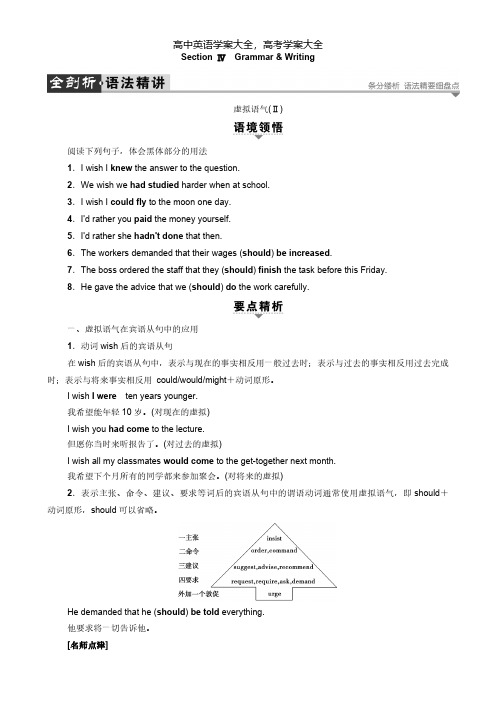
Section Ⅳ Grammar & Writing虚拟语气(Ⅱ)阅读下列句子,体会黑体部分的用法1.I wish I knew the answer to the question.2.We wish we had studied harder when at school.3.I wish I could fly to the moon one day.4.I'd rather you paid the money yourself.5.I'd rather she hadn't done that then.6.The workers demanded that their wages (should) be increased.7.The boss ordered the staff that they (should) finish the task before this Friday.8.He gave the advice that we (should) do the work carefully.一、虚拟语气在宾语从句中的应用1.动词wish后的宾语从句在wish后的宾语从句中,表示与现在的事实相反用一般过去时;表示与过去的事实相反用过去完成时;表示与将来事实相反用could/would/might+动词原形。
I wish I were ten years younger.我希望能年轻10岁。
(对现在的虚拟)I wish you had come to the lecture.但愿你当时来听报告了。
(对过去的虚拟)I wish all my classmates would come to the gettogether next month.我希望下个月所有的同学都来参加聚会。
(对将来的虚拟)2.表示主张、命令、建议、要求等词后的宾语从句中的谓语动词通常使用虚拟语气,即should+动词原形,should可以省略。
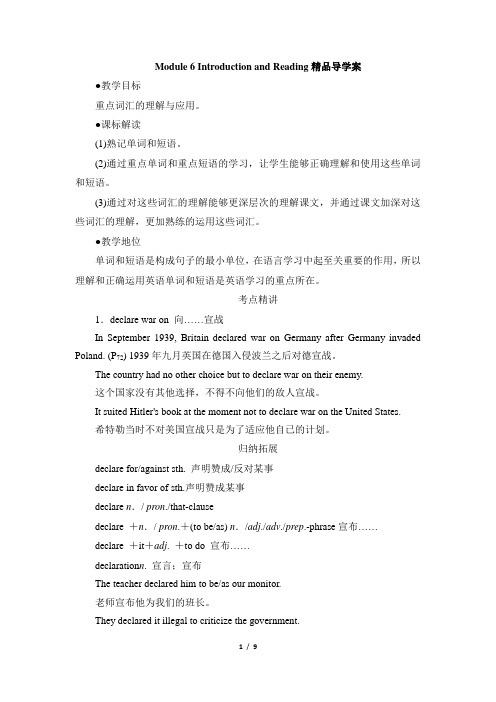
Module 6 Introduction and Reading精品导学案●教学目标重点词汇的理解与应用。
●课标解读(1)熟记单词和短语。
(2)通过重点单词和重点短语的学习,让学生能够正确理解和使用这些单词和短语。
(3)通过对这些词汇的理解能够更深层次的理解课文,并通过课文加深对这些词汇的理解,更加熟练的运用这些词汇。
●教学地位单词和短语是构成句子的最小单位,在语言学习中起至关重要的作用,所以理解和正确运用英语单词和短语是英语学习的重点所在。
考点精讲1.declare war on 向……宣战In September 1939, Britain declared war on Germany after Germany invaded Poland. (P72) 1939年九月英国在德国入侵波兰之后对德宣战。
The country had no other choice but to declare war on their enemy.这个国家没有其他选择,不得不向他们的敌人宣战。
It suited Hitler's book at the moment not to declare war on the United States.希特勒当时不对美国宣战只是为了适应他自已的计划。
归纳拓展declare for/against sth. 声明赞成/反对某事declare in favor of sth.声明赞成某事declare n./ pron./that-clausedeclare +n./ pron.+(to be/as) n./adj./adv./prep.-phrase宣布……declare +it+adj. +to do 宣布……declaration n. 宣言;宣布The teacher declared him to be/as our monitor.老师宣布他为我们的班长。
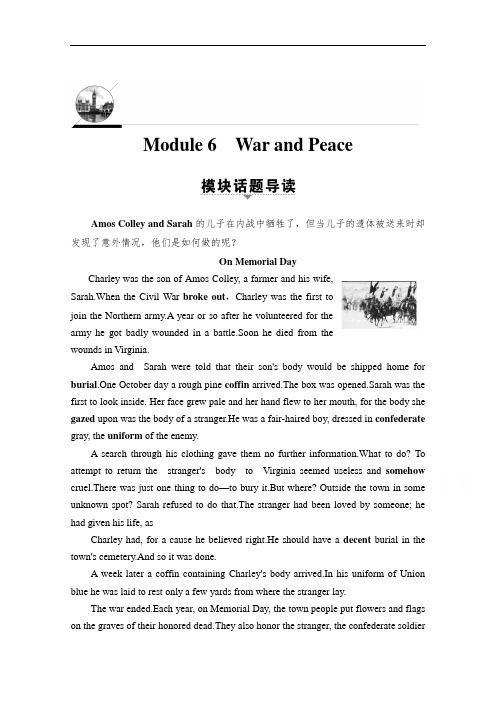
Module 6War and PeaceAmos Colley and Sarah的儿子在内战中牺牲了,但当儿子的遗体被送来时却发现了意外情况,他们是如何做的呢?On Memorial DayCharley was the son of Amos Colley, a farmer and his wife,Sarah.When the Civil War broke out,Charley was the first tojoin the Northern army.A year or so after he volunteered for thearmy he got badly wounded in a battle.Soon he died from thewounds in Virginia.Amos and Sarah were told that their son's body would be shipped home for burial.One October day a rough pine coffin arrived.The box was opened.Sarah was the first to look inside. Her face grew pale and her hand flew to her mouth, for the body she gazed upon was the body of a stranger.He was a fair-haired boy, dressed in confederate gray, the uniform of the enemy.A search through his clothing gave them no further information.What to do? To attempt to return the stranger's body to Virginia seemed useless and somehow cruel.There was just one thing to do—to bury it.But where? Outside the town in some unknown spot? Sarah refused to do that.The stranger had been loved by someone; he had given his life, asCharley had, for a cause he believed right.He should have a decent burial in the town's cemetery.And so it was done.A week later a coffin containing Charley's body arrived.In his uniform of Union blue he was laid to rest only a few yards from where the stranger lay.The war ended.Each year, on Memorial Day, the town people put flowers and flags on the graves of their honored dead.They also honor the stranger, the confederate soldierknown only to God.1.burial n.埋葬2.coffin n. 棺材3.gaze v. 凝视;看4.confederate n. 同盟5.uniform n. 制服6.somehow 莫明地7.decent adj.像样的8.break out 爆发1.How did Charley die?2.How was the stranger deal with?【答案】 1.He died from the wounds in a battle.2.He was buried in the town's cemetery.Section ⅠIntroduction & Vocabulary andReading -Preparing根据提示写出下列单词1.v.入侵,侵略2.v. 放弃,抛弃3.v. 淹死,使溺死4.n. 幸存者5.v. 持续6.v. 占领7.ad v.最后,最终8.v. 使受伤9.adj.(感到)震惊的,惊骇的10.v. 俯视,往下看11.v. 责难;谴责12.v. 营救,拯救【答案】 1.invade 2.abandon 3.drown 4.survivor st 6.occupy 7.eventually8.wound9.shocked10.overlook11.condemn12.rescue看单词学构词说明:-ly为常见的表示“以……方式,每隔……时间,具有……性质”等含义的后缀,常加在形容词和名词后面。
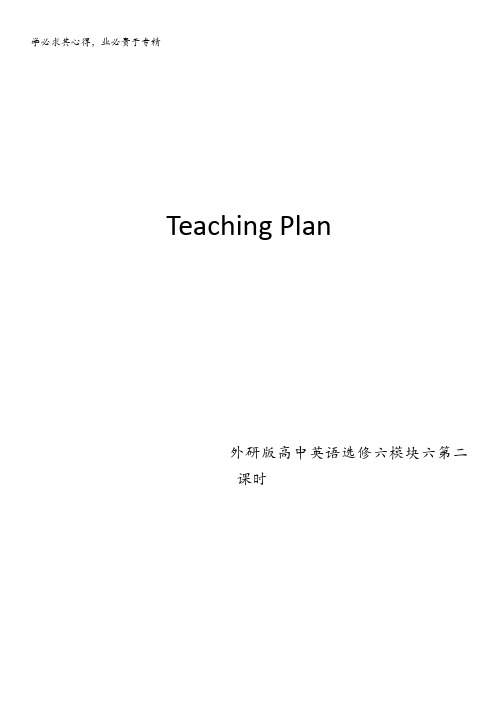
Teaching Plan外研版高中英语选修六模块六第二课时Teaching Plan of Module 6 Book 6 Period 2Topic: war and peacePeriod: 2。
Vocabulary and ReadingTime:2010—11-19Teaching class: Class Three Grade TwoTeaching aims:Language and skills:1。
Learn some vocabulary related to war andpeace,such as survivor, decare war on andso on.2. Improve the ability of understanding generalmeaning of the passge and their reading skillsand learn some detail information.3。
Be able to describe the D-Day landings andexpress their feelings about war.Process and Method: 1。
Learn some words related to the landings andwar by doing a match exercise.2。
Improve the ability of understandinggeneral idea by reading the passage with thestrategies of skimming and scanning and withthe help of pair work and group work。
3. Descibe D-Day Landings and express theirfeelings about war by seeing a short movieof the landings and by combining theirexisting knowledge and what they ‘ve justlearnt in the period in the form of group.Emotion and Value:1.Learn some information about WWII and D—Day Landings。
外研版高中英语选修6全册教案目录Module 1《Small Talk》Module 2《Fantasy Literature_Philip Pullman》Module 3《Interpersonal Relationships》Module 4《Music》Module 5 《Cloning》Module 6 《war and peace》Module 1 Small TalkTeaching aims:1. To introduce different social skills about talking in different culture and improve the students’ social skills.2. To know how to talk about obligation or lack of obligation.3. To master AAA talking model and to develop the friendly environment whenhaving talk with others.Important and difficult points:1. Get students to understand how to have a chat with others in English culture.2. Make students know the importance of small talk between persons.3. Help students to improve the cultural understanding skills in different countries.Teaching procedures:Step 1. In this part, the teacher can talk with students in small talk, and the teacher can choose different topic with different students.For example:T: What do you think of yesterday’s football match between your class and Class 3?S1: It’s great.S2: We won.T: Do you know why you won?S3: We are strong.T: Good. When we were discussing the football match just now, we were discussing serious things or having light conversation?Ss: Light conversation.T: Oh, yes. Just small talk.Step 2. After the teacher tell the students small talk, the students begin to read the dictionary definitions of small talk then ask the students to discuss the four questions inActivity1.Step 3. Divide the students into groups of two ones to discuss the five questions in Activity2. Then the teacher can choose some groups of students to show their smalltalk to all the students. The Ss can have different opinions, but they must give the reason for their opinions.Step 4. Make a talk between the Ss and the teacher, then introduce the topic about must, have to, don’t have to and mustn’t.For example:T: You are now in Senior Two, and I think you are all good students, although some of you sometimes behave not very properly. So I’m going to ask you some questions. Do you think students have to be on time at school?Ss: …T: Oh, yes. You are right. You have to. Then say something that you must do.S1: …S2: …T: And anything you mustn’t do?S1: …S2:…Ask the Ss to talk about the following topics:What is obligation?What is lack of obligation?According to the talking method, the teacher can introduce the definitions of obligation and lack of obligation.Step 5. Ask the students to finish Activity1 and then let the Ss to talk about the answers they have made.Ask the Ss to make similar sentences impressing obligation and lack of obligation using the words they just practiced.Step 6. Make a competition among the Ss to make sentences using must, have to, don’t have to, mustn’t, needn’t do and don’t need do. And the team which make sentences will win the competition.Step 1. Ask Ss to discuss the sentences in Activity 1 and then check the answers of the Ss’. Then learn the words in this part with the Ss.Step 2. Ask the Ss to read the text quickly and then finish Activity2. Then ask all the Ss to discuss the questions of Activity 4. Then ask the Ss to tell us the usage of the words in Activity1 and Activity 4 and find the sentences in the text: impress, damage, encourage, prepare, avoid, lack, recognize, smile.Step 3. Ask the students to read the text again, then answer the questions in Activity3 and encourage the Ss to have different answers. If the time isn’t enough, we can solve the problem in the following ways.(1)Discuss it after class.(2)Discuss the following questions as the important points.I.What do people think about those who talk too much?II.Why is it a good idea to nod and smile when the other person is talking?III.What does the quotation from Benjamin Disraeli tell you about people? Then ask the Ss to prepare for Activity5 and then ask the Ss to tell the meanings of the phrases.Step 4. Important word or phrases1. Which definitions make small talk sound like a positive thing?Sound is a link verb,its meaning in Chinese:听起来。
Module 6 War and Peace本模块以“war and Peace ”为话题。
内容涉及二战中的诺曼底登陆、德国闪电战等背景知识,引导学生学会对战争类影片进行评论,认识到联合国维和部队等重要国际组织在维护世界和平上所起的作用。
学生通过本模块学习,可以深刻了解战争的残酷性,认识和平的重要性。
【知识目标】Key vocabulary: abandon, operation, occupy, troop, wound, shocked, memorial, overlook, weary, condemn, nationality, rescue, campaign, sacrifice, company, mess, worthwhile, retreat, arm, personnel, despiteKey structures: owe sth to sb, inspire sb to sth, draw attention to.Never had he had any experience like that.【能力目标】1. To arouse Ss ’ interest in learning about war and peace .2. To develop Ss ’ reading skills .3. To help Ss to talk about the D —Day landings of the Second World War .【情感目标】Learn to cherish peace.1. 本模块的生词和短语。
2. 学习虚拟条件句的用法。
3. 学习如何描述过去发生的事情。
4. 写关于战争题材电影的影评。
【教学难点】1. 谈论诺曼底登陆战役的重要意义。
2. 让学生表达自己对战争的看法。
3. 熟练完成本模块所要求的电影影评写作和其他书面练习。
4. 思考战争给人类带来的影响。
Ⅰ.Match the word with its meaning.1.abandon A.营救,拯救2.drown B.俯视,往下看3.survivor C.使受伤4.last D.放弃,抛弃5.occupy E.淹死,使溺死6.eventually F.(感到)震惊的7.wound G.幸存者8.shocked H.最后,最终9.overlook I.占领10.rescue J.持续答案:1~5 DEGJI 6~10 HCFBAⅡ.Write down the meaning of phrases in each sentence.1.The key to the problems is to make a breakthrough with a clear aim and succeed in solving them. 取得重大突破/进展2.Can you pick me up at the airport at 10 am tomorrow?用车接3.At one point, we were friends.However, now we are enemies. 曾经4.Xu Beihong was known as a famous artist in China. 作为……而著名5.Have you taken part in the sports meet held last week?参加6.In former times, Kings of small states used to declare war on their neighbours.向……宣战Germanoccupied France.参考答案:In the Second World War, Germany occupied many countries.In these countries, France was included.The United States, Britain and Canada united to invade France against Nazi domination.We call the event that the soldiers of these countries landedⅠMatch the following paragraphs with their main ideas.①Passage 1 A.describing the 60th Anniversary of the DDay landings②Passage 2 B.introducing the reason of the DDay landings③Passage 3 C.telling us the history of a company called Able Company答案:①~③ BCAⅡRead the text carefully and choose the best answer.1.Which of the following countries took part in the DDay landings according to the passage?A.Japan. B.Germany.C.South Africa. D.America.2.Which of the following is TRUE about the DDay landings?A.It marked the beginning of World War Ⅱ.B.It showed that Germany was successful.C.It marked the beginning of the end of World War Ⅱ.D.It was a failure because almost none of the soldiers from Able Company survived. 3.What happened to Boat 5 when it was sailing towards the beach?A.The soldiers on it jumped out before they got to the beach.B.The boat sank into the water and soldiers were killed.C.It was hit one kilometer from the beach.D.20 soldiers on the boat drowned before help arrived.4.Which of the following is TRUE about the poem on the memorial?A.It can only be seen on the war memorial in France.B.It was written by an English novelist.C.It was first published in The Times newspaper in 1946.D.It was only part of a poem.答案:1~4 DCCDⅢAnalyze the following difficult sentences in the text.1.Operation Overlord started when boats full of soldiers landed on the beaches of Normandy in France, known as the DDay landings.[句式分析]Operation Overlord,主语 started,谓语when boats full of soldiers landed ... in France,,when引导的时间状语从句known as the DDay landings.,作后置定语,修饰的是Operation Overlord[尝试翻译] “霸王行动”开始于D日登陆。
Module 6 War and Peace 导学案一. 思考以下问题.1) What does a war bring to people?2) Do you like war or peace in the world? Why?3) What results would be if the war broke out?二. 重点词汇.1. adj.复仇的2. v.入侵,侵略3. v.放弃,抛弃4. n.行动5. v.淹死,使溺死6. v. 持续7. v.占领8. v.使受伤9. adj.震惊的,惊骇的10. v.俯视,往下看11. v.责难,谴责12. v.营救,拯救三.重点短语.1. declare war on2. be known as3. take part in4. attempt to do sth5. think about (doing ) sth6. make a breakthrough7. pick up8. fight with9. contribution to10. be situated on11. go down四.重点句子1. If they had reached the beach, they would probably have been killed.本句是“针对过去的虚拟语气”,其形式是:If + 主语+ had +过去完成式动词+ ……:主语+ would (should, could, might) + have +过去完成式动词+……。
2. The survivors lay on the beach, exhausted and shocked.“ exhausted and shocked” 是形容词短语作伴随状语, 表示状态.e. g. The boy went back home,_______________(depress).He turned away, _________________(disappoint).3. The cemetery and memorial are situated on the cliff overlooking the beach and the English Channel, from where the boats attempted their landings.overlooking the beach and the English Channel 为现在分词作后置定语._________________为介词+副词引导非限制性定语从句.五.知识点.1. demand (v.) P71(1) demand sth. 要求…e.g. The customer demanded a reasonable explanation from the company.(2) demand + to do 要求做…e.g. 他们要求被告知每件事。
Module 6 War and PeaceVocabulary Study:1. abandon vt.1>抛弃;舍弃;离弃abandon one's home/country/friend/post(职位)/ship/wifeFrom James’s face, I could see he was terrified of ______________(被抛弃) by us.2>放弃;停止做(某事)---give upAbandon a bad habit/search/ the plan因为下雨比赛停止了。
They_____________________ because of rain.3>放纵;放任abandoned himself to…纵情于--- 沉溺于---He abandoned himself to pleasure. 翻译:_________________________________ abandoned adj. 放纵的,堕落的;被遗弃的an abandoned farmabandon n. 放任狂放with abandon 放肆地2. operation n. 行动;运转, 操作;实施, 手术;军事行动the operation of an old machine----运转, 操作the operation of a law-----实施He had an operation on his heart. ----手术in operation 实施//运转中;实施着、经营着bring//put sth. into operation实施(法律、等);运作(机械等)The new rules will come into operation next month. 开始运转//活动;开始实行3. occupy v. 占, 占用, 占领, 占据The table occupies a lot of space in his room.(占用空间)The dinner and speeches occupied two hours.(占用时间)The army//troops occupied that country for several years after World War II.(占领)be occupied with//in…=occupy oneself with//in…正从事//专心于….在忙着…翻译:我在聚精会神的读这些历史书。
_____________________________________ 4. troop n.群, 组, 多数, 军队;1>一群(人或野生动物),一团;in troops___________a troop of deer____________ troops of visitors_________ 2>(常用复数) 军队,部队敌人向我军发动了袭击。
_______________________________________________ vi. 群集,结队,成群而行We trooped into the meeting.________________________________辨析:troop 着重指许多士兵这个集体,army着重指军队这个集体,特指陆军。
与navy(海军), air force (空军)相对而言。
5. wound n. 创伤,伤害,苦痛The soldier received________________________________. 这名士兵背部受了重伤。
v. 伤害,损害, The bullet__________________________. 子弹打伤了他的肩膀。
He was/felt deeply wounded by their disloyalty. 因为他们不忠, 他十分伤心.the wounded 伤员6. shocked adj. 震惊的,震撼的I was shocked by his wickedness. ____________________________________I was shocked at the news of his sudden death.=I was shocked to hear the news of his sudden death.7. memorial n. 纪念碑(堂),纪念仪式Raise (erect) a memorial to the dead ___________________a memorial meeting//service追悼会Memorial Day(美国)阵亡将士纪念日(五月最后一个星期一,亦可称为Decoration Day)8. overlook v. 俯看,远眺,没注意到;忽略,漏看;不追究(过失等)Overlook a mistake 忽略一个错误overlook a person’s fault 不追究一个人的过错We __________________from our house. 我们可从家中俯瞰教堂.你忽略了这个工作中的几个错误。
________________________________________9. weary adj.疲倦的、疲劳的;感到厌倦/厌烦的(be weary of);使人疲倦的a weary look疲倦的表情 a weary journey 令人疲倦的旅行I _____________________ your problems. 我听腻了你那些麻烦事.The people__________________________.人民对这场战争越来越厌倦了.vt. vi. 使人疲倦, 感到厌烦,He was wearied with walking all day. 他厌烦了整天步行。
I soon wearied of listening to the lecture. 我不久就对那演讲感到厌烦了。
10. condemn vt. 判刑,处刑; 责备,谴责,责难;逼迫某人//使某人注定做…The newspapers condemned the politician for bribery.He was condemned for murder and sent in prison;他因谋杀被判处入狱。
The criminal was condemned to death._________________________________ 11. nationality n.国籍,民族, 国家, 部落,win( achieve/ obtain) nationality 获得独立There are two main nationalities in our village. 我们村子有两大民族。
He has French nationality._____________________---What is your nationality? 你是哪国人?---___________________________________________________我们是中国人12. rescue vt. 援救,救出,营救He dived from the bridge__________________________他从桥上跳入水中去抢救那溺水儿童.The firemen rescued a baby from the burning house.n. 援救,解救,营救come to a person’s rescue //go to a person’s rescueThe rescue team made ten rescues in a week.13. campaign n. 战役,运动,活动He fought in the North African campaign during the last war.上次战争中他在北非战役参战.start a campaign against smoking ____________start a campaign for fundraising_________v. 参加活动,参加竞选Joan is campaigning for equal rights for women. 琼在从事争取妇女平等权力的活动。
war指大规模的战争,是战争的通称。
battle指一次会战或战斗。
campaign 指战役(a series of battles)14. sacrifice n. 牺牲,供俸,祭品v. 牺牲,祭祀,贱卖She sacrificed her career to marry him. 她为了嫁给他牺牲了自己的事业.He achieved his success at great sacrifice. 他做了很大的牺牲才获得成功。
at the sacrifice of one’s health ___________ sacrifice oneself //one’s life for…___________15. company n.1>友谊;交情;陪伴He kept me company.他陪伴我。
I enjoy his company. 有他为伴真是愉快。
2>伴侣;同伴I had no company on the journey. 我在旅行中没有同伴。
3>(陆军的)连,连队 a company commander 连长4>公司;商号He is working in a shipping company. 他在一家运输公司工作。
Phrases:keep sb company陪伴某人;与某人同行for company作为同伴//陪伴in one’s company 在某人的陪伴下in company 在人前;一起、结伴者in company with sb 与某人一起keep company with…陪伴某人;与某人为友16. mess n. 杂乱,混乱:扰乱的或令人困窘的情境, 散乱的东西;make a mess of…使(计划、工作等)成一团糟,弄乱;弄糟in a mess 陷入困境,难以收拾,杂乱get into a mess 陷入困境The children’s room was in a terrible. 孩子们的房间乱七八糟。
The local economy is now in a mess. ___________________________________ 17. worthwhile adj.值得(做)的It's worthwhile to take/taking the trouble to explain a job fully to new employees. 翻译:________________________________________________________________ Nursing is________________________________. 护理工作是很值得干的职业. That's worthwhile.____________________________( be worth doing / be worthy of being done / be worthy to be done)18. retreat v. 撤退,隐退,向后倾The soldiers had to retreat when they were beaten in battle. 士兵在战斗中受挫,不得不撤退The defeated troops were forced to retreat to the coast.______________________ n. 休息寓所,撤退,隐居The troop made good their retreat from the occupied city.部队从沦陷的城市安全撤出。